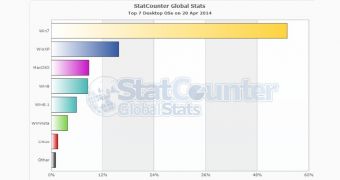Windows XP was officially retired by Microsoft on April 8, but plenty of computers worldwide are still running it, even though it’s pretty clear that the security risks are very big if they do not upgrade to another operating system as soon as possible.
Data provided by StatCounter for April 20 show that 15.71 percent of the desktop PCs across the world were running Windows XP on Easter Day, while Windows 7 remains the leading OS with a market share of 55.01 percent.
Mac OS X comes third with 8.71 percent, followed closely by Windows 8 with 8.46 percent and Windows 8.1 with 5.87 percent.
Microsoft hasn’t commented on these figures, although it’s pretty clear that the company cannot be pleased with the fact that so many users are still running Windows XP, but the previous recommendations to switch to a newer operating system are still available on its official website.
Redmond warns that those who stay on Windows XP can continue to work on their computers, but as soon as someone finds a vulnerability in the operating system, their data could be easily compromised.
“If you continue to use Windows XP now that support has ended, your computer will still work but it might become more vulnerable to security risks and viruses,” Microsoft says.
“Internet Explorer 8 is also no longer supported, so if your Windows XP PC is connected to the Internet and you use Internet Explorer 8 to surf the web, you might be exposing your PC to additional threats. Also, as more software and hardware manufacturers continue to optimize for more recent versions of Windows, you can expect to encounter more apps and devices that do not work with Windows XP.”
Statistics provided by a different market researcher, Net Applications, claim that Windows XP is still the world’s second most-used operating system with a market share of 28 percent, while Windows 7 leads the market with approximately 47 percent.
Most users are refusing to upgrade to a different OS version mostly because of the high costs of the upgrade, as Windows XP computers cannot cope with the system requirements of a newer release, such as Windows 8.1.
As a result, many are trying to delay the upgrade as soon as possible, so it’s probably only a matter of time until an unpatched vulnerability in the operating system is found and everyone would speed up the migration process.

 14 DAY TRIAL //
14 DAY TRIAL //